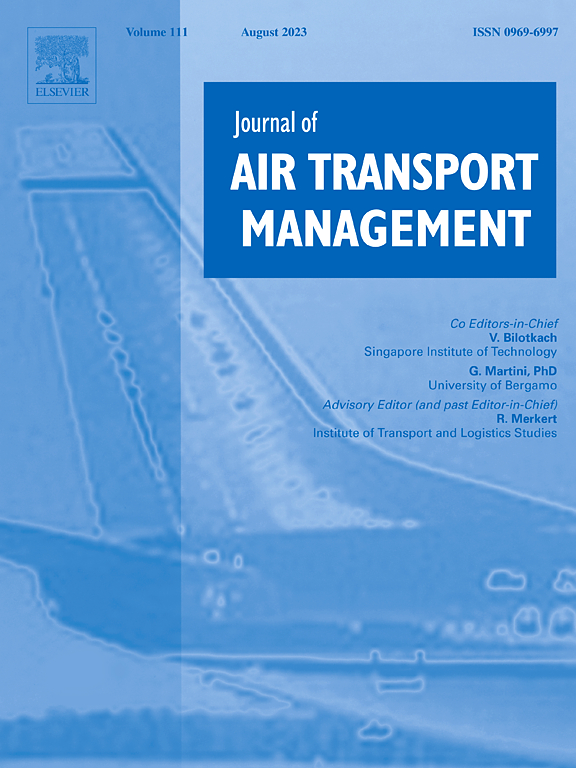Do healthy and environmentally sustainable inflight foods matter to international flight passengers? Frequent vs. occasional flyers
IF 3.9
2区 工程技术
Q2 TRANSPORTATION
引用次数: 0
Abstract
Airlines continuously seek strategic ways to impress their passengers and build memorable experiences. Inflight food services as an imperative interaction, the research included healthy and environmentally sustainable attributes (e.g., production method, product origin), reflecting the emphasis on longevity/well-being and sustainability to design optimal inflight food bundles as well as the brand and taste attributes. This exploratory research investigated differences in inflight food preferences between frequent and occasional flyers. A total of 16 full-profile pairwise comparison questions of mixed levels for five attributes were given to the sample of international flight passengers (n = 490). The participants were asked to rate inflight food bundles using a 9-point Likert scale. The results indicate that healthy and environmentally sustainable inflight foods will be preferred over brand-named or tasty foods when served onboard. There were notable differences in inflight food preferences between occasional and frequent flyers. While both flyers preferred low-calorie and tasty foods made with nationally sourced ingredients, frequent flyers highly preferred branded foods made with organically grown ingredients. In contrast, occasional flyers desired generic branded foods made with conventionally grown ingredients. The study findings are discussed further to help airline marketers build a desirable inflight food bundle.
对国际航班乘客来说,健康和环境可持续的机上食品重要吗?经常乘坐飞机的乘客与偶尔乘坐飞机的乘客
航空公司不断寻求给乘客留下深刻印象和难忘体验的战略方法。机上食品服务作为一种必要的互动,研究包括健康和环境可持续属性(如生产方法、产品来源),反映了对长寿/健康和可持续发展的重视,以设计最佳的机上食品组合以及品牌和口味属性。这项探索性研究调查了经常乘坐飞机和偶尔乘坐飞机的乘客对机上食品偏好的差异。研究人员向国际航班乘客样本(n = 490)提供了五种属性的共 16 个全貌成对比较问题。参与者被要求使用 9 点李克特量表对机上食品进行评分。结果表明,与品牌食品或美味食品相比,健康和环境可持续的机上食品更受欢迎。偶尔乘坐飞机的乘客和经常乘坐飞机的乘客对机上食品的偏好存在明显差异。虽然这两种乘客都偏好使用本国食材制作的低热量美味食品,但经常乘坐飞机的乘客更偏好使用有机种植食材制作的品牌食品。与此相反,偶尔乘坐飞机的乘客则更喜欢使用传统原料制作的普通品牌食品。我们将进一步讨论研究结果,以帮助航空公司营销人员建立理想的机上食品组合。
本文章由计算机程序翻译,如有差异,请以英文原文为准。
求助全文
约1分钟内获得全文
求助全文
来源期刊

Journal of Air Transport Management
TRANSPORTATION-
CiteScore
12.40
自引率
11.70%
发文量
97
期刊介绍:
The Journal of Air Transport Management (JATM) sets out to address, through high quality research articles and authoritative commentary, the major economic, management and policy issues facing the air transport industry today. It offers practitioners and academics an international and dynamic forum for analysis and discussion of these issues, linking research and practice and stimulating interaction between the two. The refereed papers in the journal cover all the major sectors of the industry (airlines, airports, air traffic management) as well as related areas such as tourism management and logistics. Papers are blind reviewed, normally by two referees, chosen for their specialist knowledge. The journal provides independent, original and rigorous analysis in the areas of: • Policy, regulation and law • Strategy • Operations • Marketing • Economics and finance • Sustainability
 求助内容:
求助内容: 应助结果提醒方式:
应助结果提醒方式:


